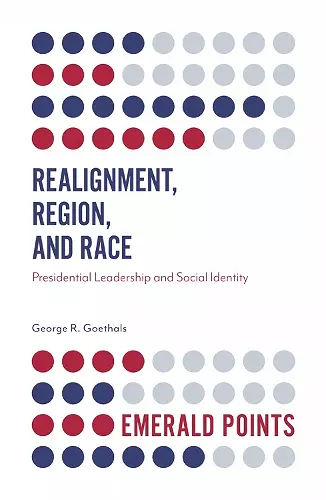Realignment, Region, and Race
Presidential Leadership and Social Identity
Format:Paperback
Publisher:Emerald Publishing Limited
Published:30th Apr '18
Should be back in stock very soon

The Trump presidency may well be the first phase of a new American political alignment deeply rooted in identity politics. Now more than ever, it seems especially important to understand how leaders compete to engage different human motivations—how presidents, presidential candidates, and other political leaders appeal to potential followers’ needs for economic well-being, safety, self-esteem, and a sense of significance. It is time to come to terms with the roles of race and region in US political history.
In Realignment, Region, and Race, George R. Goethals addresses this challenge head-on, exploring the place of racial dynamics in American politics from Abraham Lincoln to Donald Trump. He integrates psychology and historical understandings of presidential leadership and politics to explain the way the politics of racial justice and needs for positive social identity have led to different regions in the United States changing party affiliation. He describes the realignment by region of the two major political parties in the United States, the Democrats and Republicans, between the Civil War and the present day, and he considers how for over a century and a half the two parties have offered different social identities, often related to race, that appeal to powerful motives for self-esteem and significance. Goethals’s findings uncover deep contexts for understanding how current political leaders engage experiences and attitudes towards African Americans, Hispanic Americans, and Asian Americans in order to tell particular stories about American and regional identities.
Realignment, Region, and Race is essential reading for students of politics, history, and psychology, and it is of keen interest to anyone concerned with the power that identity politics has taken on in recent American elections.
Goethals argues that racial dynamics is responsible for how and why the North and South switched political parties between Abraham Lincoln's election in 1860 and George W. Bush's in 2000. Furthermore, these racial dynamics are perpetuated largely by social identity concerns, he says, that is, by people's need to have their political leaders validate them and the groups by which they define themselves. He discusses the realignment of American politics; leadership, motivation, and social identity; the American Revolution to the Mexican War; Republicans for racial justice: Abraham Lincoln and Ulysses S. Grant; the Republican retreat from founding principles 1877-1920; migration and realignment: African-Americans move north, the GOP moves south; and popular vote tectonics: Republican dominion gives way to Democrats. -- Annotation ©2018 * (protoview.com) *
ISBN: 9781787437920
Dimensions: 198mm x 129mm x 12mm
Weight: 218g
208 pages